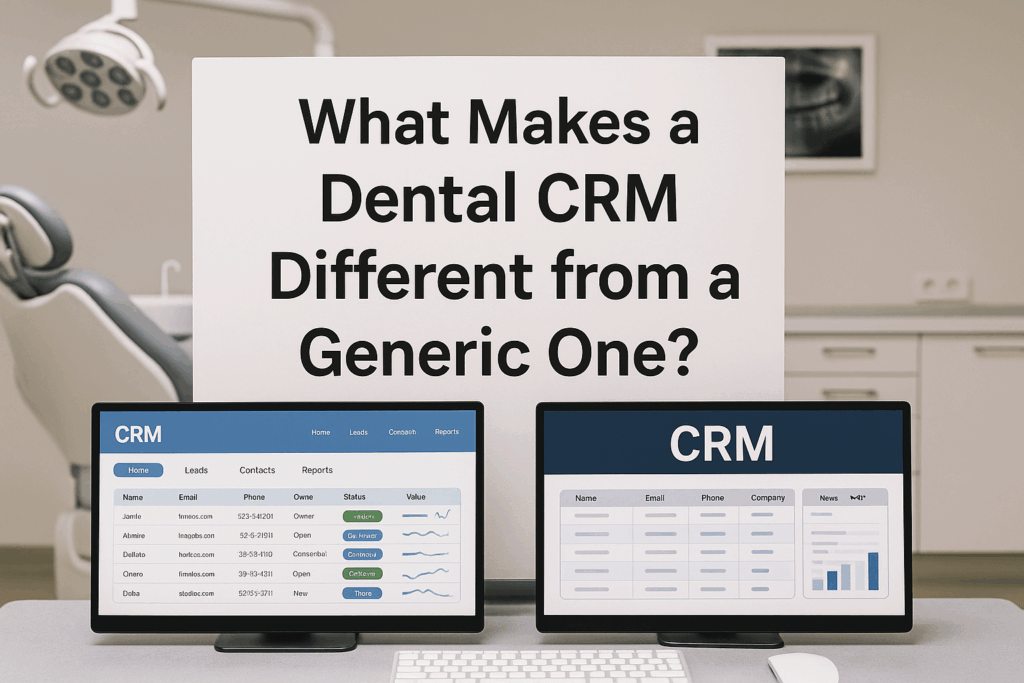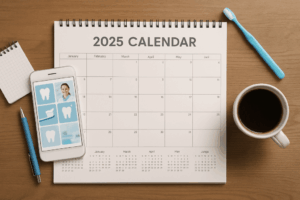If you have tried running your clinic with a generic CRM, you’ve probably noticed that something is missing. Sure, it tracks contacts and interactions, but it doesn’t understand your patients, your treatments, or your compliance needs.
That’s where a dental CRM comes in.
Think of it like the difference between a standard toolkit and one designed specifically for dentists. Both have tools, but only one has the exact instruments you need for the job.
In this blog, we’ll explore:
- How a CRM for dental clinic operations goes beyond basic contact management
- Why dental CRM systems improve patient experience and retention
- The measurable business impact of choosing the right dental management CRM
Let’s dig in.
1. Dental CRMs Speak the Language of Dentistry
A generic CRM can store contacts, but a dental CRM is built around your clinic’s workflows: appointments, treatment histories, automated patient reminders.
For example:
- Treatment-specific notes let you log detailed procedure info, perfect for tracking Invisalign progress or periodontal care.
- Digital forms reduce in-office paperwork by letting patients complete medical histories beforehand.
- Automated recall reminders help send follow-up notices for six-month cleanings and retain patients without manual effort.
In fact, 51% of dental professionals now use automated appointment reminders (and 85.5% of them say these reminders are key to their practice’s success) largely because they reduce no-shows
With a dental management CRM, your software fits your workflows, not the other way around.
2. Compliance Is Built In
Dentistry is heavily regulated by the Australian Dental Association and Australian Health Practitioner Regulation Agency (AHPRA). From data privacy to marketing rules, you need a CRM that supports your legal obligations, not complicates them.
Leading dental CRM systems offer:
- Encrypted patient data storage that meets privacy standards
- Permission-based user controls to restrict who sees patient info
- AHPRA-compliant integrations with booking and billing systems
You could try piecing these features into a generic CRM, but that increases compliance gaps and admin overhead.
3. Patient Communication Is Personalised & Effective
Patients should not be treated as your “leads.” Instead, they’re people entrusting you with their care. A CRM for dental clinic operations supports:
- Segmented reminders by appointment type, communication preference (SMS vs. email), and timing
- Automated post-treatment instructions, such as care after extractions or whitening
- Preference records, like “prefers morning slots” or special anxiety notes
Personalised communication drives real results. Automating reminders alone reduces no-shows by nearly 23%. Plus, 30% of patients prefer SMS and 65% prefer emails for reminders, data your CRM can use
4. It Integrates Seamlessly with Clinical Tools
A real dental CRM system connects everything:
- X-rays link to patient records
- Treatment plans update automatically in real time
- Billing syncs without manual duplication
That means fewer errors, less admin duplication, and smoother workflows across your team.
5. It Drives Measurable Growth
These systems are not just data stores. They serve as your growth engines.
With integrated reporting, you can track:
- New patient acquisition by source
- No-show and cancellation trends
- Treatment acceptance rates
Industry-wide, top-performing dental practices see conversion rates as high as 23.1% (compared to the 2.3% industry average). Knowing where you stand helps focus marketing budgets and team efforts effectively.
6. It Enhances the Entire Patient Journey
From tracking early interest to future follow-ups, a dental CRM system supports every touchpoint:
- Before: Patients book online, fill in forms, and receive instant confirmation
- During: Your staff sees unified records, improving care consistency
- After: Automated follow-ups, feedback requests, and reminders keep engagements high
And this isn’t just convenience; automated financial reminders help secure past-due payments for your clinic with online payments speeding the process further.
7. Why Not Just Use a Generic CRM?
You can, but expect to spend time:
- Designing workarounds for appointment scheduling
- Adding compliance layers manually
- Integrating with dental-imaging tools yourself
- Pulling data from disconnected systems
A dental CRM delivers natively what generic CRMs require heavy customisation to support.
Future-Proofing Your Clinic with the Right CRM
The dental landscape is evolving, driven by preferences for online booking, integrated care, and AI-powered reminders.
Choosing a dental CRM means you can:
- Offer patient-first experiences
- Streamline staff workflows
- Make compliance painless
- Use data to fuel growth
This is where our team at Dental Rank comes in. We help clinics select and implement CRM for dental clinic operations that integrate tools, streamline workflows, and enhance patient satisfaction.
Ready to Upgrade Your CRM?
Stop fitting a square peg into a round hole. Switch to a dental management CRM made for your clinic and watch patient loyalty grow, no-shows drop, and revenue climb with the help of Dental Rank.
Let’s make your clinic the go-to choice in your area. With a strategic dental social media calendar for 2025, consistent posting, and professional guidance, you can attract, engage, and retain more patients than ever.
Schedule a free consultation today and see how we can help you streamline your digital marketing efforts.




